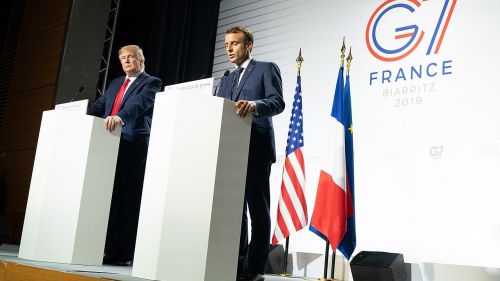The US Shouldn't Ignore the G-7 Gender Equality Recommendations

The United States needs to do more to ensure women are equally represented in legislative bodies.
Solutions for gender equality
Citing the overwhelming prevalence of gender inequality globally, Emmanuel Macron focused this year’s G-7 summit on feasible solutions to enhance gender equality. On Sunday, the Gender Equality Advisory Council – an independent body composed of 35 members from over 23 countries, including international organization leaders, government representatives, journalists, artists, and Nobel Peace Prize laureates—outlined four key areas of action that would make tremendous strides in ending gender-based violence, ensuring equitable and quality education and health, promoting economic empowerment, and ensuring full equality between men and women in public policies.
While all countries must commit to taking action, the United States and other G-7 countries have the power to lead these transformations. This year, the council’s recommendations recognize the successes of the US’ Women, Peace, and Security Act of 2017, which strengthens efforts to prevent and resolve conflict by increasing women’s participation in negotiation and mediation efforts. More importantly, though, the recommendations underscore that the United States needs to do more. In particular, the United States needs to do more to ensure women are equally represented in legislative bodies. Currently, women are better represented in Tunisian government—at 31%—than they are in the United States.
Based on the Council's recommendations, I see two specific actions the United States can and should take to ensure gender-equal representation. The US should ratify the Convention on the Elimination of All Forms of Discrimination Against Women (CEDAW); the US is the only G-7 member country that hasn’t ratified the convention. Additionally, the US must enshrine in US law the creation of independent bodies dedicated to gender equality.
A great model for this is the Finnish Equality Act, which created independent bodies tied to the Ministry of Social Affairs and Health. Each body has a different mandate: one is in charge of the creation of equitable governmental action and legislation, another is concerned with the verification of law enforcement and action on cases related to discrimination, the third is a jurisdictional body able to impose penalties, and the fourth is a forum in which women’s associations can participate.
If the United States fails to implement these recommendations, its reputation and economy will suffer. Failing to ratify CEDAW, for example, hampers and undermines US efforts to fight for democracy and human rights domestically and globally. How can the United States convincingly advocate for women in other countries when it has yet to adequately advocate for women here? Moreover, the US gross domestic product (GDP) is losing out by not incorporating a gender lens in its policies. Closing the gender gap in the US workforce could at $4.3 trillion to the country’s GDP by 2025.
A gender-equal world is not only desirable because it is morally right, but also because it yields noteworthy economic benefits for women and for everyone. No country is currently gender-equal, and no country is on track to be gender-equal by 2030. And this inequality has a high economic cost. The World Bank has found that if women had the same lifetime earnings as men, each person’s wealth would increase, on average, by $23,620, for a total of $160.2 trillion increase in global wealth.
If the United States fails to act on the G-7 Council’s recommendations, the whole world is losing out. It is up to the US and other G-7 countries to take bold actions towards gender-equality and help pave the way to a more equitable and prosperous would.

